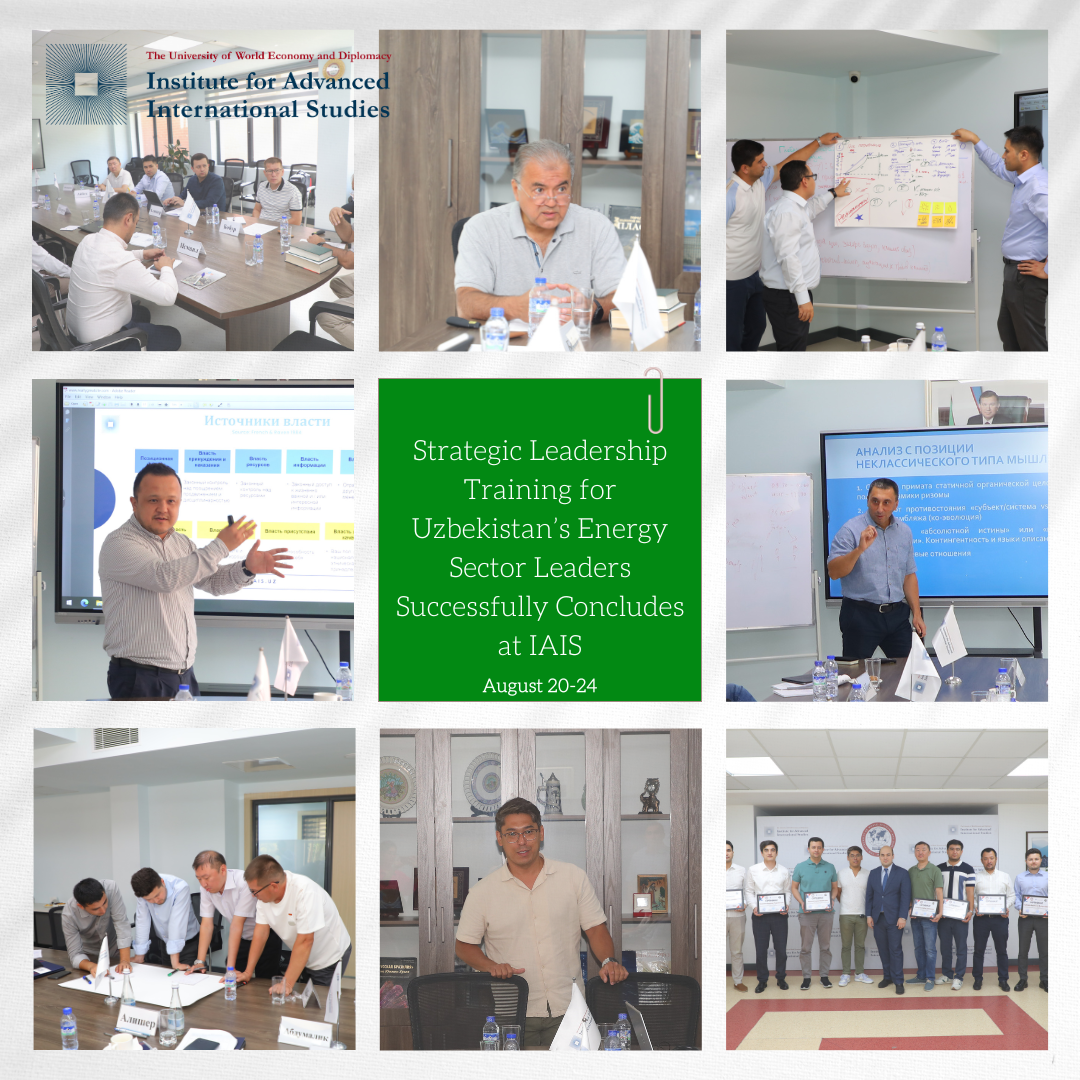
Tashkent, Uzbekistan – 26 August 2024. The Institute for Advanced International Studies (IAIS) has successfully concluded a comprehensive training program aimed at enhancing the strategic planning and leadership skills of key figures in Uzbekistan’s energy sector. This intensive program, which brought together senior executives and decisionmakers, focused on equipping participants with advanced management techniques, strategic decision-making tools, and leadership development strategies.
Over the course of the training, participants engaged in a series of interactive workshops, case studies, and simulations designed to address the unique challenges faced by Uzbekistan’s energy sector. Topics covered included leadership, strategic planning, effective communication, change management, and sustainable energy practices. The program also featured sessions on global energy trends and best practices, providing attendees with a broader understanding of the international energy landscape.

Day One: Introduction to Energy and Geopolitics. The training program was inaugurated with a speech by Dr. Sodyq Safoev, First Deputy Chairman of the Senate of Oliy Majlis of the Republic of Uzbekistan and Rector of the University of World Economy and Diplomacy (UWED). Dr. Safoev emphasized the critical importance of training professionals who can advise the government on energy industry matters, particularly during this period of global economic restructuring. Sherzod Abdullaev, Director of IAIS, led Module One, which delved into the foundational concepts of energy and geopolitics. Participants were introduced to the intricate relationship between energy and geopolitics, offering a historical panorama of global energy evolution from antiquity to the modern era. Presenting Module Two, which illuminated the landscape of global energy resources, Khayotjon Ibragimov, Head of the Centre for Energy Diplomacy and Geopolitics, meticulously dissected the primary types of energy resources—oil, gas, coal, nuclear, and renewables—while exploring their geographical distribution and the profound influence of geography on energy dynamics. The day culminated with Module Three, conducted by Jakhangir Saliev, Senior Research Fellow at the Centre for Energy Diplomacy and Geopolitics, who provided an in-depth analysis of the structure of energy markets, elucidating the core mechanisms of their operation, pricing strategies, and the intricacies of energy trading.

Day Two: Fundamentals of Leadership. The second day pivoted to the exploration of leadership fundamentals. Ulugbek Ishankhodjaev, Head of the Center for American Studies, inaugurated the program with Module Four, where participants engaged with the concept of leadership, exploring the essential qualities that distinguish a leader from a manager. Shakhboz Akhmedov, Deputy Director of IAIS and Head of the Centre for Sustainable Development, guided the participants through two subsequent modules on leadership typologies and communication strategies. Attendees examined various leadership styles, honed their ability to identify and adapt their leadership approach to diverse situations, and enhanced their skills in effective communication and conflict resolution.

Day Three: Strategic Analysis. The third day was dedicated to the realm of strategic analysis, beginning with a lecture by Rustam Makhmudov, a Leading Research Fellow at the Centre for Anthropology and Conflict Studies. Participants were immersed in both classical and contemporary models of strategic thinking, equipping them with a robust analytical framework. The afternoon sessions, encompassing Modules Eight and Nine, featured a detailed exposition of PESTLE analysis, with speaker guiding participants through the critical examination of political, economic, social, technological, cultural-legal, and environmental factors that shape strategic landscapes.
Day Four: Strategic Planning. On the fourth day, the focus remained on strategic analysis and planning. Rustam Makhmudov returned to lead three comprehensive modules, where participants mastered the art of SWOT analysis, identified key efficiency factors, and explored creative approaches to balancing decision-making models. The day’s discourse concluded with an exploration of the limiting factors in strategic planning, such as the rut effect and opportunistic behavior, fostering a nuanced understanding of strategic constraints.

Day Five: Personality Typology and Conclusion. The final day was devoted to the exploration of personality typology. Participants engaged in self-assessment exercises, identifying their strengths and weaknesses through the lens of distinct personality types, including analysts, diplomats, sentinels, and explorers. The training concluded with reflective discussions, encapsulating the insights gained throughout the intensive program.
The closing ceremony was marked by a certificate awarding ceremony and speeches from Akram Umarov, First Vice Rector for the Academic Affairs of UWED, and Khayotjon Ibragimov, who emphasized the importance of continuous professional development in driving the country’s energy sector forward. Participants expressed their gratitude for the opportunity to learn from top experts and to share insights with peers, noting that the skills gained during the training would be instrumental in guiding Uzbekistan’s energy policies and projects in the coming years.
This training initiative is part of IAIS’s ongoing commitment to supporting Uzbekistan’s economic development by fostering leadership excellence across various sectors. The successful completion of this program represents a significant step towards strengthening the strategic capabilities of energy leaders, positioning the country for a sustainable and prosperous energy future.